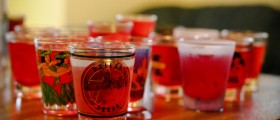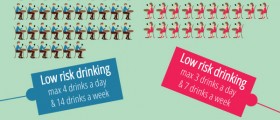Seriously, try some Pepcid AC before you drink - it doesnt do the whole trick but it definitely reduces most if not all of the unpleasant side effects mentioned in this post. Also, drinking slowly is the key, as this problem is a direct result of your body being unable to properly break down the alcohol, so go easy on it. Try for some information regarding the flush and some measures you can use to counteract the negative side effects.
Regards,
J
***edited by moderator*** web addresses not allowed
Loading...
Loading...
Effects of Alcohol Metabolites
Alcohol undergoes a two-step process
in its metabolism (see figure). First, an
enzyme (i.e., alcohol dehydrogenase)
metabolizes alcohol to an intermediate
product, acetaldehyde; then a second
enzyme (aldehyde dehydrogenase
[ALDH]) metabolizes acetaldehyde to
acetate. Acetaldehyde is a chemically
reactive substance that binds to proteins
and other biologically important
compounds. At higher concentrations,
it causes toxic effects, such as a rapid
pulse, sweating, skin flushing, nausea,
and vomiting. In most people, ALDH
Vol. 22, No. 1, 1998 57
Alcohol Hangover
metabolizes acetaldehyde quickly and
efficiently, so that this intermediate
metabolite does not accumulate in high
concentrations, although small amounts
are present in the blood during alcohol
intoxication. In some people, however,
genetic variants of the ALDH enzyme
permit acetaldehyde to accumulate.
Those people routinely flush, sweat,
and become ill after consuming small
amounts of alcohol.
Because of the similarity between
the acetaldehyde reaction and a hangover,
some investigators have suggested
that acetaldehyde causes hangovers.
Although free acetaldehyde is not present
in the blood after BAC’s reach
zero, the toxic effects of acetaldehyde
produced during alcohol metabolism
may persist into the hangover period.
Effects of Factors Other
Than Alcohol
Factors other than alcohol also may
contribute to a hangover. These factors
include the following possibilities.
Congeners. Among other reasons,
people consume alcoholic beverages
for their ethanol content. Most alcoholic
beverages contain smaller amounts of
other biologically active compounds,
however, including other alcohols.
These compounds, known as congeners,
contribute to the taste, smell, and
appearance of alcoholic beverages.
Congeners may be produced along
with ethanol during fermentation,
generated during aging or processing
through the degradation of the beverage’s
organic components, or added
to the beverage during the production
process. Investigators now believe
that congeners may contribute to a
beverage’s intoxicating effects and to
a subsequent hangover. Research
has shown that beverages composed
of more pure ethanol, such as gin
or vodka, induce fewer hangover
effects than do beverages containing
a large number of congeners, such
as whiskey, brandy, or red wine
(Chapman 1970; Pawan 1973). A
hangover also may occur when pure
ethanol is administered, however.
One specific congener implicated
in hangover effects is methanol, which
is an alcohol compound found in
alcoholic beverages along with ethanol.
The two compounds differ slightly in
chemical structure in that methanol
contains one less carbon atom and two
fewer hydrogen atoms than ethanol.
The same enzymes that metabolize
ethanol, alcohol dehydrogenase, and
aldehyde dehydrogenase also metabolize
methanol; however, the products
of methanol metabolism (i.e., formaldehyde
and formic acid) are extremely
toxic and in high concentrations may
cause blindness and death.
Support for methanol’s contribution
to hangovers comes from several sources.
For example, distilled spirits that are
more frequently associated with the
development of a hangover, such as
brandies and whiskeys, contain the
highest concentrations of methanol.
Moreover, in an experimental study
with four subjects who consumed red
wine containing 100 milligrams per
liter (mg/L) of methanol, Jones (1987)
found that elevated blood levels of
methanol persisted for several hours
after ethanol was metabolized, which
corresponded to the time course of
hangover symptoms. Methanol lingers
after ethanol levels drop, because ethanol
competitively inhibits methanol metabolism.
The fact that ethanol readministration
fends off hangover effects
may be further evidence of methanol’s
contribution to the hangover condition,
given ethanol’s ability to block methanol
metabolism and thereby slow the production
of formaldehyde and formic acid.
Certain people develop headaches
soon after drinking red wine but not
after drinking white wine or vodka.
Recent research finds that red wine, but
not white wine or vodka, can increase
plasma serotonin and plasma histamine
levels. The specific agents in wine
responsible for these increased levels
are not known. Increased plasma serotonin
and histamine can trigger headaches
in susceptible people (Pattichis
et al. 1995; Jarisch and Wantke 1996).
Loading...
Loading...
Loading...
Loading...
Loading...
Unfortunately my hangovers have started to get really bad again, hence the reason im checking this forum, so ill have to go back and have some tests again, I hope its just the ulcers as I think its unfair for people to say just dont drink, everyone deserves a tipple now and again, and I need to socialise for my job.
Loading...
Loading...
my advise, just smoke pot, never have i got sick from weed... but i'll probably end up drink ing again sometime because of social norm, i hope i never get a reaction like last 3 days, if i do i'm quitting for good.
Loading...
Loading...
I am 18 years of age and am currently in my first year of university, now before going to uni I drank occassionally but not heavily. Obviouslygetting off your face at Uni is a fairly normal occurance and is part of the fun. The first few times I went out I drank, and I was hungover, but I wasn't sick or anything. Then I went out on a social and played this drinking game called "Pub Golf" and basically what you do is have a list of drinks which you must drink at each "hole" a.k.a pub/bar, and you have a certain amount of "Strokes" a.k.a sips, drinks, to do it in. This was my first social, and I kept being called FRESHER by all the older students, so I thought what the hell, I'm going to go for it and really tried to win. Until I threw up in the toilets of one of the bars, and therefore proceeded to go home where I was severly ill. However since then if I have any amount of alcohol, I am really ill either all through the night, or the next morning, either being sick, and violently sick, or constantly up with diarrhea. It's doing my head in, the only thing I seem to be able to get away with is a glass of wine with a meal and even then if i have to much I get a severe headache... I can't go out and drink and have fun with the other students out of fear that I'm going to be severely ill the next day. It's nice to know I'm not the only person experiencing some strange reactions.
Loading...
Thanks xxx
Loading...
Loading...
Hi All,
My wife has had this problem for 13 years, she is definitely not a heavy drinker, but, after just a small amount of alcohol, be it just a half glass of beer or wine, she suffers very badly the next day with; sickness, diaorhea, intense headache, fever, malaise, extreme tiredness, in fact to use her words; 'body shut down'.
My wife has spoken to our GP who says that he has never heard of this problem. We do however have a friend, female, who has a similar but not identical complaint.
I have read the earlier posts and presume, possibly incorrectly, that most if not all posts come from women.
Is this a recognised medical condition?
Thanks in advance.
Loading...

















